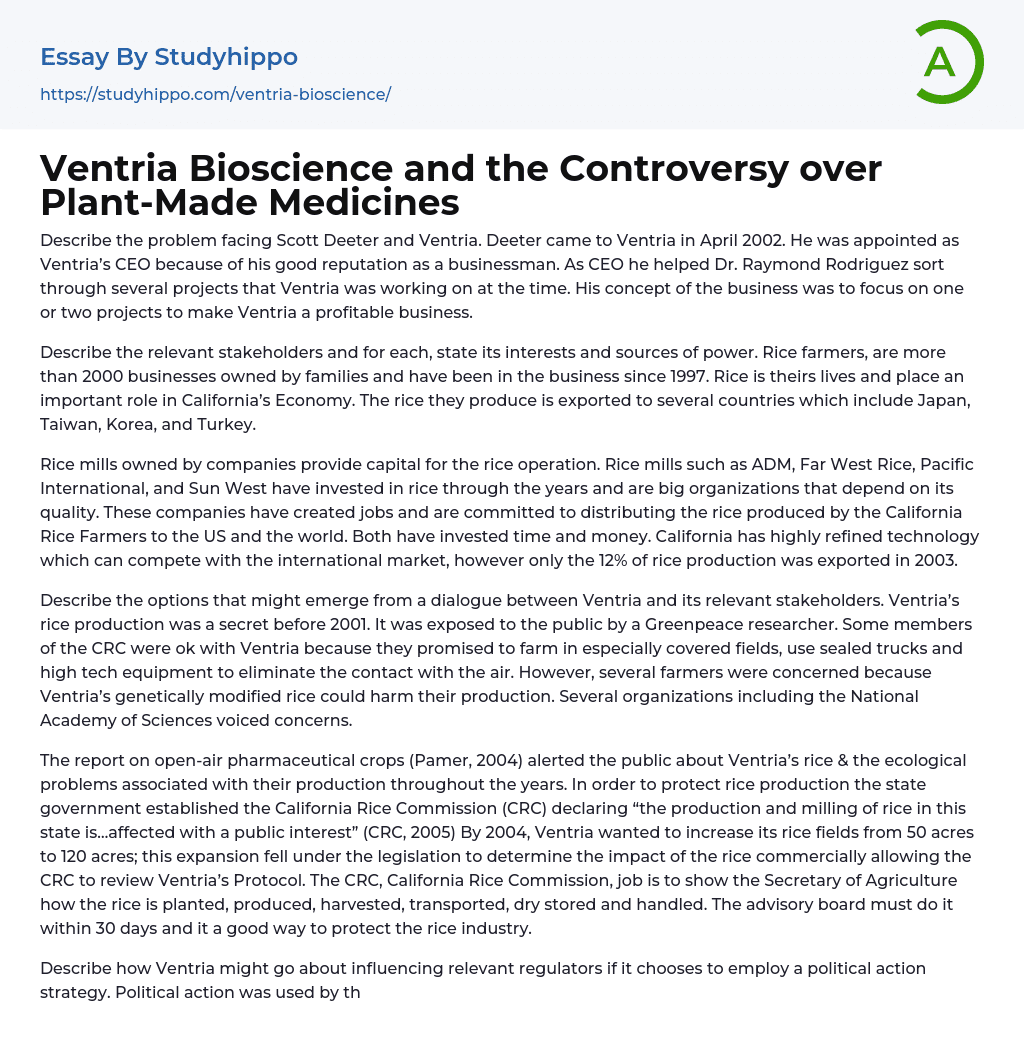

Ventria Bioscience and the Controversy over Plant-Made Medicines Essay Example
Scott Deeter and Ventria faced a problem. Deeter joined Ventria in April 2002 and became its CEO due to his positive reputation in business. In this role, he assisted Dr. Raymond Rodriguez in managing various projects being undertaken by Ventria at that time.
The main idea of his business was to concentrate on a few projects to ensure Ventria's profitability. To analyze this concept, we must consider the stakeholders involved, along with their interests and sources of power. The stakeholders in question are rice farmers, who are comprised of over 2000 family-owned businesses and have been working in this industry since 1997. Rice farming is not just their occupation but also a crucial component of California's economy. The rice they cultivate is exported to various countries, including Japan, Taiwan, Korea, and Turkey. Furthermore, rice mills owned by companies provide the necessary capital fo
...r these rice operations.
Rice mills like ADM, Far West Rice, Pacific International, and Sun West are major players in the rice industry, relying on its quality. These organizations have made significant investments and have contributed to job creation, as well as being dedicated to distributing the rice grown by California Rice Farmers both domestically and globally. California boasts advanced technology that can compete on the international market. Despite this advantage, only 12% of rice production was exported in 2003, indicating room for growth in overseas trade.
In the dialogue between Ventria and its stakeholders, possible options are discussed. Prior to 2001, Ventria's rice production was kept confidential, until it was revealed to the public by a Greenpeace researcher. While some members of the CRC expressed acceptance towards Ventria’s practices, as they vowed to cultivate thei
rice in specifically enclosed fields, transport it in sealed trucks, and employ advanced technology to avoid air contamination, certain farmers expressed concerns due to the potential negative impact of Ventria's genetically modified rice on their own production.
Numerous organizations, such as the National Academy of Sciences, expressed concerns regarding the ecological issues associated with the production of Ventria's rice. The report on open-air pharmaceutical crops (Pamer, 2004) raised awareness among the public about these problems. To safeguard rice production, the California state government established the California Rice Commission (CRC), which stated that rice production and milling in the state are of public interest (CRC, 2005). In 2004, Ventria sought to expand its rice fields from 50 acres to 120 acres. This expansion fell under legislation that required the CRC to examine the impact of commercially cultivating rice, thus leading to the review of Ventria's Protocol. The role of the CRC, also known as the California Rice Commission, is to provide information about rice planting, production, harvesting, transportation, dry storage, and handling to the Secretary of Agriculture. The advisory board must perform this task within a timeframe of 30 days, ensuring protection for the rice industry.
Ventria can employ a political action strategy to influence relevant regulators. Both Ventria and the stakeholders, including farmers and millers, utilized political action by lobbying the Secretary of Agriculture. Lobbying is a method used to exert influence on political matters.
Ventria's attempt to expand its genetically modified (GM) rice was unsuccessful due to its limited influence. Despite this, Ventria decided not to employ excessive lobbying tactics to achieve political action. However, on April 9, the Secretary of Agriculture dismissed Ventria's protocol review.
This decision was made in consideration of the rice farmers who had already established rice exports to Japan, as their hard work could be endangered if their rice became contaminated by GM rice. If Ventria opts not to engage in dialogue or political action, or if these approaches prove ineffective, they still have other options. Ventria's political efforts proved fruitless as the Secretary of Agriculture ruled in favor of the farmers, millers, and the general public. Consequently, Ventria chose to address the concerns raised by various stakeholders.
Deeter, Ventria's CEO, made the decision to implement the use of protective equipment for field production, storage, and transportation. Additionally, they have decided to permit visits to their research facilities while maintaining detailed records of the research conducted. However, despite all of Ventria's efforts, stakeholders have expressed their dissatisfaction and the company's attempts to expand have been unsuccessful. In the field of biotechnology, progress often takes longer than anticipated (Lawrence and Weber, 2011). As a result, Ventria still has a significant journey ahead and investors are not pleased with the current situation.
They have been unable to expand since the company started.
References
- Pamer, M. (2004, July). Prescription Rice Message posted to http://ecologycenter.org/terrain/issues/summer-2004/prescription-rice/
- California Rice Commission statical Report, May 1, 2005
- Lawrence, A. T. (2008). Business and Society. In B.
Gordon (Ed. ), Ventria Bioscience and the Controversy over Plant-Made Medicines (Vol. 13th Ed., p. 500). New York, NY: McGraw-Hill Irwin.
.
;
- Agriculture essays
- Albert einstein essays
- Animals essays
- Archaeology essays
- Bear essays
- Biology essays
- Birds essays
- Butterfly essays
- Cat essays
- Charles Darwin essays
- Chemistry essays
- Dinosaur essays
- Discovery essays
- Dolphin essays
- Elephant essays
- Eli Whitney essays
- Environmental Science essays
- Evolution essays
- Fish essays
- Genetics essays
- Horse essays
- Human Evolution essays
- Isaac Newton essays
- Journal essays
- Linguistics essays
- Lion essays
- Logic essays
- Mars essays
- Methodology essays
- Mineralogy essays
- Monkey essays
- Moon essays
- Mythology essays
- Noam Chomsky essays
- Physics essays
- Plate Tectonics essays
- Progress essays
- Reaction Rate essays
- Roman Numerals essays
- Scientific essays
- Scientific Method essays
- Scientist essays
- Seismology essays
- Space Exploration essays
- Stars essays
- Sun essays
- Thomas Edison essays
- Tiger essays
- Time Travel essays
- Universe essays



